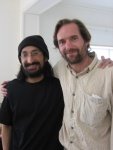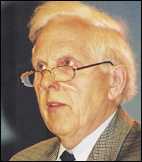 It's been a few days since this happened so probably most of you know by now that three of the Christian Peacemaker Teams members who were kidnapped last November in Iraq were rescued on Thursday. (The fourth, Tom Fox, was found dead a couple weeks ago.) The three men were rescued by a Multi-National Force, made up, it sounds like, mainly of armed forces from their home countries of the UK and Canada.
It's been a few days since this happened so probably most of you know by now that three of the Christian Peacemaker Teams members who were kidnapped last November in Iraq were rescued on Thursday. (The fourth, Tom Fox, was found dead a couple weeks ago.) The three men were rescued by a Multi-National Force, made up, it sounds like, mainly of armed forces from their home countries of the UK and Canada.I'm incredibly grateful that they were rescued, that they are alive, that they seem to have been treated well in captivity, and that the MNF who rescued them honored CPT's peace stance by not using violence in the rescue operation. You can read more about this on CPT's website, where there are links to news articles and statements from the men who were captured and from CPT.
Apparently the CPTers are being accused of not showing gratitude for their rescue to the army personnel who released them. I think that's a hard balance, because although I'm sure they are grateful to be free, they and CPT asked repeatedly for the armed forces not to be involved in this situation. So I appreciate the statement they issued:
I do not believe that a lasting peace is achieved by armed force but I pay tribute to [the soldiers] courage and thank those who played a part in my rescue.... There's a real sense in which you are interviewing the wrong person. It's the ordinary people of Iraq you should be talking to, the people who have suffered so much over many years and still await the stable and just society they deserve.

Who's working for the release of all those Iraqis who are being detained illegally without charge by the same Multi-National Forces? Are the armed forces continuing to honor the work of CPT as they continue the Iraqi occupation in order to make it less likely that someone would want to capture Westerners?
Nonviolent resolution of conflict is so difficult. It seems so impractical. And yet, these men were released by armed forces in a nonviolent way. The army was challenged to think of a different way to go in and rescue these men than their default of violence, and I think the fact that it was successful says a lot about what's possible with nonviolence. What if in every situation the "army" (or whatever it would be called) would sit down and think about how they might be able to solve the situation other than through the use of force?
Most Christians would say, I think, that most violence is not justifiable and it should only be used as a last resort. But when do we know that it's the last resort? How many nonviolent options have actually been tried in each circumstance? What if we had sent spies into Iraq and taught people about nonviolent resistance and civil disobedience instead of invading their country with weapons? What if we had encouraged and empowered those same people who are leaders of paramilitary factions in Iraq to use nonviolent methods to overthrow the unjust government which was oppressing them? What if the people of Iraq had been given tools to come together and work on their freedom together and to create their own peaceful way?
Perhaps it would have seemingly taken longer. Perhaps lots of innocent people would have died. Perhaps they would have created a new government over which Western governments had less power.
And perhaps it would have taken less time, because this war has already lasted three years and the end is still not in sight. And perhaps innocent people would have died, but their blood would not be on our heads, and their deaths would have been seen as martyrdoms to encourage solidarity and resolve in the hearts of those left behind. And perhaps people should be free to create the form of government that will work best for them, and not be controlled by outside forces that don't take the time to understand their culture...and besides, wouldn't they be more likely to look on our country with favor if we had helped them achieve their own freedom while acknowledging their personhood, rather than not even keeping an accurate count of how many Iraqis die in this conflict every day?
I believe CPT is working to do all this. They have had 120 volunteers in Iraq since the war started, according to their website. With those 120 volunteers they have achieved the release of many illegally detained Iraqis, raised awareness about the abuses going on in Abu Ghraib and other facilities, stayed in the country when almost all other humanitarian aid agencies have left due to danger, and helped form a Muslim Peacemaker Team based on Islam.
What could they do if they had as many individuals involved and committed to the cause of nonviolent conflict resolution as the armed forces have individuals committed to violent conflict resolution? What could CPT do if it had even half, or a quarter of the number involved in the army? Isn't it easier to successfully and lastingly solve a conflict with love than with hate?

Pictures are: 1) Harmeet Sooden & James Loney, 2) Norman Kember, 3) Tom Fox. From CPT website, www.cpt.org
3 comments:
I met a muslim recently, living in the West, who seemed terrified that he would be beheaded by Westerners. All the anti-muslim talk apparently has made him paranoid. It's good that the CPTers didn't experience that.
A peaceful solution is preferable, but not if we are forced to rely on people who are deeply, historically and culturally opposed to everything we live for.
Sadly, even good Christians are sometimes driven to faithlessness and sin.
It's an interesting social dynamic of one group saying to another 'we don't believe in your idealism', and the other group saying 'then we'll abandon our idealism and may the best man win'.
Hmm...that's an interesting thought about clashing cultural idealisms, and how we've just given up on the idealisms to duke it out. Well, I don't think that's the best way, even if we don't agree that others are doing the right thing. But I'm not in control...
I think even if we disagree we can still work nonviolently to show that others' ways aren't the best option. Sure, some things have to do with culture, and what one culture thinks is OK is different from what another thinks. But there are still things which are just wrong all around--like killing innocent people. These things can be protested nonviolently--we don't have to give up our ideals to "fight" them.
Yes, self-sacrifice is never easy, but it's the perfect way. Increase brains, reduce violence.
It has to be kept in mind that some people actually like warfare, and think they will benefit from it.
War solves nothing and hurts everyone.
See you later,
I enjoy your blog.
Peter
Post a Comment